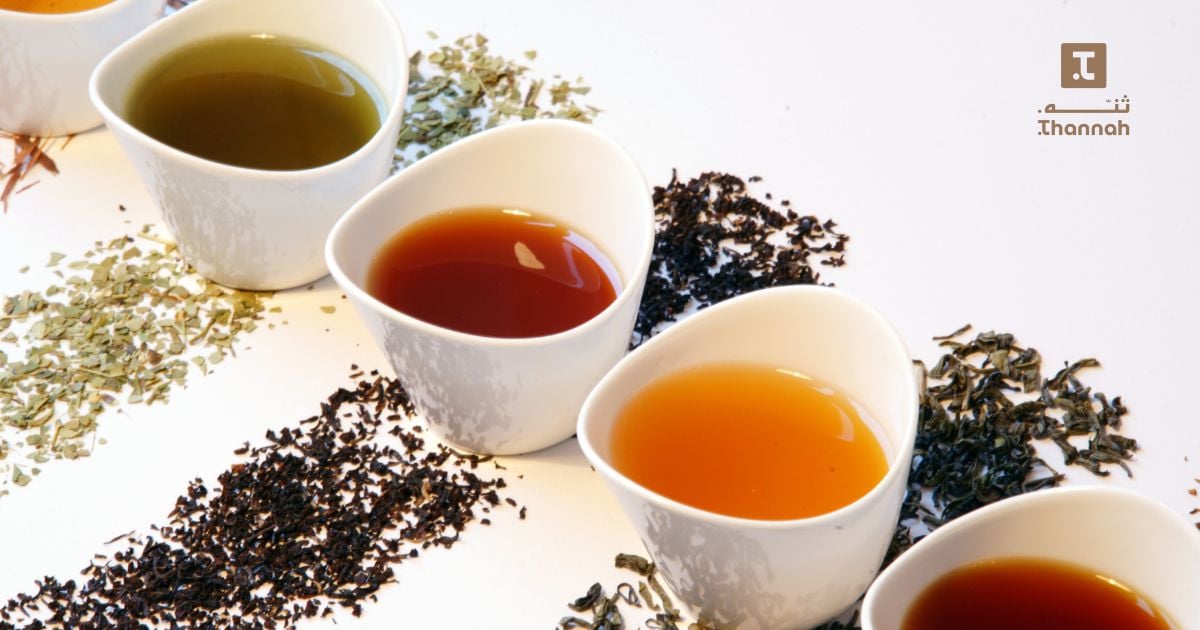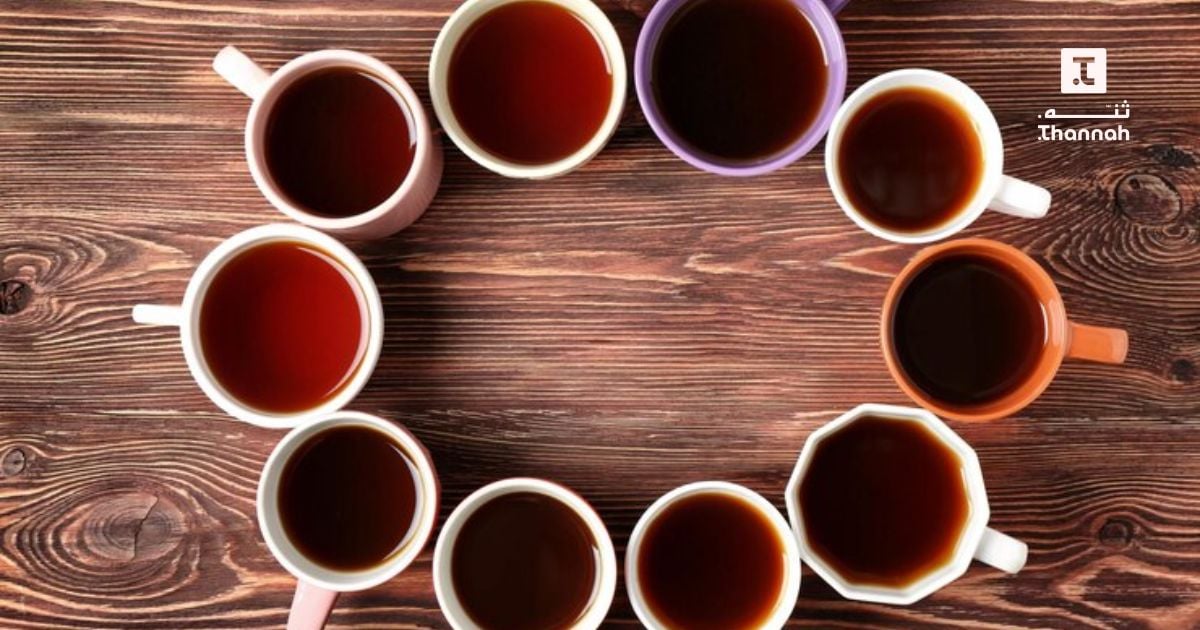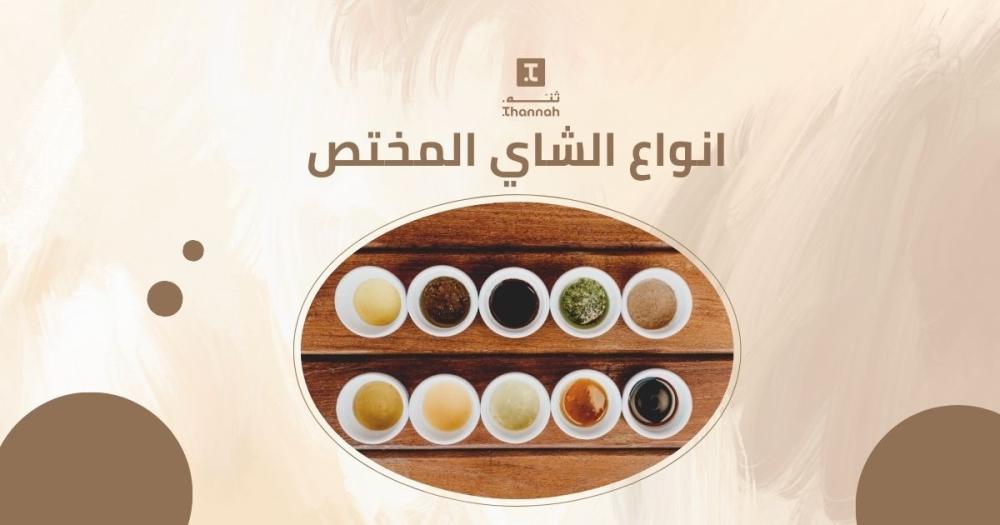You might think that all teas are the same, but that's far from the truth. The type of tea leaves and the method of cultivation greatly affect the flavor and nutritional value of your cup of tea. And because we know you're tired of trying traditional tea, it's time to switch to specialty tea and experience the many benefits it offers thanks to its carefully selected leaves and high-quality production method.
Why choose specialty teas over regular tea? With Thana, the best Saudi tea shop. Specialist, you will know the complete answer to get a tea taste you have never experienced before.
What is specialty tea?
Specialty tea is tea that is produced and processed according to precise standards that rely heavily on quality at every stage of cultivation, harvesting, and processing. This type of tea differs from regular commercial tea in that it comes from specific farms known for their unique climatic and agricultural conditions, which directly affects the taste and aroma.
When you drink a cup of specialty tea, you should know that the leaves have been carefully selected, and that the timing of harvest, processing, and oxidation have been carefully considered.

History and Origins of Specialty Tea
Specialty tea originated in the mountainous regions of East Asia. In China, for example, tea is part of social and religious rituals. Longjing specialty tea is one of the oldest and most popular varieties, distinguished for its high quality for hundreds of years.
In Japan, tea traditions have evolved significantly, with varieties such as matcha and gyokuro emerging. From here, specialty tea began to make its way outside its original homeland. Today, specialty tea farms are found in locations known for their fertile soil and suitable climate, such as:
- Darjeeling in India : Famous for producing a distinctive tea sometimes called the "champagne of tea" for its distinct flavor.
- Uji, Japan : An area rich in the finest matcha and gyokuro, where tea is grown in the shade.
- Yunnan, China : Known for producing Pu'er tea brewed using traditional methods that preserve its distinctive character.
Benefits of specialty tea
Specialty tea is completely different from regular, traditional tea, not only in taste and flavor, but also in benefits. Here are five surprising reasons you may not know about the benefits of this type of tea:
- Better for the environment : Specialty tea is grown without the use of harmful pesticides and fertilizers, making it better for the environment and your health.
- Higher nutritional value : Specialty tea leaves are grown in nutrient-rich soil, which produces a higher concentration of antioxidants and flavonoids. These compounds work together to provide a range of health benefits, including improved cardiovascular function, improved digestion, and even weight loss.
- A distinct and different flavor : The natural growing conditions that specialty tea undergoes give it a rich and distinct flavor, and you'll notice the difference with every sip.
- Rare Flavors : Specialty tea offers a wide range of rare flavors that you won't find in regular tea. We promise you'll find a distinctive tea to suit all tastes.
So, the next time you have a cup of tea, consider choosing a specialty tea without hesitation.
Specialty tea types
Specialty tea is not one type, but rather has different types and shapes with varied tastes and flavors. The most famous types of specialty tea around the world are:
white tea
White tea is one of the rarest and most refined types of tea, originating in China, specifically the Fujian province. What sets it apart from other types is its simple processing method: the young buds are carefully picked and dried naturally without any oxidation.
In terms of flavor, white tea has a mild flavor and a texture known for its noticeable lightness. The most famous varieties are:
- Silver Needle Tea (Bai Hao Yin Jin) : Its production method is entirely based on soft silver buds.
- Bai Modan : A tea that combines the buds and first leaves, so it has a deeper flavor.
White tea has numerous health benefits, most notably its high levels of antioxidants, which support cell health and combat free radicals. It's also known for its role in maintaining skin radiance and contributing to a stronger immune system thanks to its natural compounds.
Japanese matcha tea
Japanese matcha tea is one of the most prominent symbols of Japanese culture. Its origins go back to Japan, where it is prepared from green tea leaves known as "tencha," which are thoroughly dried and then ground using granite stones until they turn into a very fine powder.
Matcha tea has a concentrated flavor that combines sweetness and natural bitterness. When prepared, it develops a creamy texture as the powder dissolves completely in hot water. It is known for its bright green color, resulting from its high chlorophyll content.
Matcha tea has numerous benefits, most notably its high content of powerful antioxidants such as catechins, which help boost the body's defenses. It also contains theanine, which supports mental clarity and helps with concentration, in addition to its role in stimulating metabolism.
Pu'er tea
Pu'er tea is one of the oldest and most popular types of tea in China. Its origins can be traced back to Yunnan Province, which is famous for its extensive plantations and ancient tea-making traditions. What distinguishes Pu'er tea from other types of tea is that it undergoes a meticulous fermentation process that can last for months, and sometimes even years.
Boers are divided into two main types:
- Raw Pu'er or Xing Pu'er : Stored to undergo a natural aging process, the flavor deepens over time.
- Boiled Pu'er or Shu Pu'er : It undergoes a quick and carefully controlled fermentation process, which gives it a distinctive taste in a shorter period.
Oolong tea
Oolong tea is one of the most distinctive types of tea, and is grown mainly in China and Taiwan. Its leaves are partially oxidized, standing midway between green tea, which is not oxidized, and black tea, which undergoes full oxidation.
It has a wide variety of flavors, ranging from a light floral or fruity taste to a deep, smoky flavor, depending on the degree of oxidation and the techniques used during preparation. Its aroma ranges from floral to fruity with hints of honey.
Among the techniques used in preparing oolong tea:
- Sun drying : The leaves are exposed to sunlight to reduce the moisture content and prepare them for the oxidation stage.
- Frequent massage : The leaves are massaged to stimulate oxidation and bring out the natural flavors.
- Roasting : This technique is applied to some varieties to add a smoky depth to the flavor.
Oolong tea is known for its ability to support heart health by helping to lower cholesterol levels. It also helps improve digestion, especially after eating heavy meals, and boosts metabolism for more effective weight management.

Factors that distinguish different types of specialty tea
There are many factors that give specialty tea its distinctive character and high quality. The environment and cultivation method work together to produce distinctive leaves with flavors you'll love from the first taste. The most prominent of these factors are:
- Altitude : The geographical location and height of the plantations above sea level have a direct impact on the characteristics of the tea. At higher altitudes, tea leaves grow slowly, allowing the flavors and aromatic compounds to accumulate more deeply. The presence of fog and constant humidity in these environments also adds layers of depth to the taste.
- Climate : A temperate climate is an important factor in shaping the quality of tea leaves. Stable temperatures and regular rainfall contribute to the production of healthy leaves rich in natural substances that enhance the taste and aroma of the tea.
- Soil : The soil that houses the tea roots is a factor in determining its flavor. Mineral-rich soil, especially volcanic soil, gives tea leaves mineral elements that add depth to the flavor.
- Cultivation and Harvesting Methods : Hand-picking remains one of the most important methods for ensuring the selection of the finest leaves and buds, which enhances the quality of the final tea product. Furthermore, implementing organic and sustainable farming practices maintains ecological balance and ensures a pure, pollutant-free product.
Thane tea is the best in the world of specialty tea.
Specialty tea has been carefully considered in every detail, from cultivation to preparation. In this context, Thana Store offers the best tea and coffee store in Saudi Arabia. Two types that express true expertise in selecting and processing tea leaves with the utmost precision and care:
- Jamr Tea Capsules : A tea with a strong flavor that reflects the characteristics of carefully aged leaves, and is considered the number one specialty tea in Saudi Arabia.
- Northern Tea Capsules : Offer a calm, balanced, and light flavor that is loved by those who prefer light drinks with a simple, unaged flavor.
Thana Tea Shop always strives to provide the best types of specialty tea with high quality, distinctive and unique flavor, and reasonable prices. Order now and discover what authentic tea tastes like.
Frequently Asked Questions
What are the types of specialty tea?
Specialty teas include white, green, oolong, black, pu-erh, and matcha. Each type has a different processing method that affects the taste, aroma, and texture. These types are carefully produced from specific farms known for the quality of their leaves.
What is specialty tea?
Specialty tea is tea produced according to precise standards that ensure you get the highest quality cup of tea in terms of taste and aroma. The leaves are selected from regions known for their ideal agricultural conditions.

